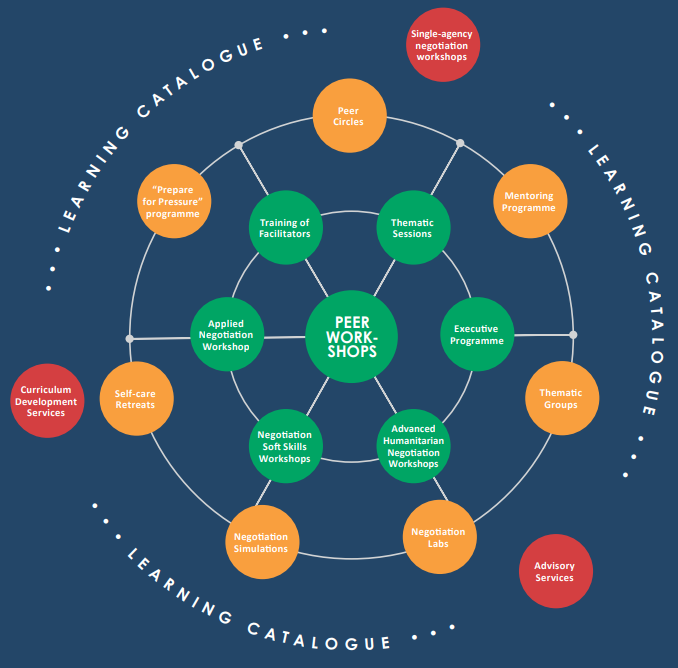DISCOVER OUR LEARNING OFFER
The CCHN provides a wide range of learning and sharing opportunities depending on the needs of individual practitioners, senior managers, or humanitarian agencies. Most of our programmes are available online, in multiple languages, and free of charge.
Discover how the CCHN can help you develop advanced skills and receive professional support from thousands of other practitioners around the globe who face the same challenges.
To register for our upcoming negotiation workshops and activities, see our event calendar.
1
Individual capacity building workshops
Sharpen your negotiation skills with experience-based workshops.
2
Peer-to-peer activities
Exchange expertise with other frontline negotiators through community activities.
3
Support for humanitarian organisations
Build the negotiation capacity of your organisation.

PART ONE: INDIVIDUAL CAPACITY-BUILDING WORKSHOPS
Sharpen your negotiation skills with experience-based workshops.
Peer Workshops
A first step into your CCHN learning pathway and an opportunity to join a global community of humanitarian negotiators.
Executive Programme
An interactive and confidential safe space for humanitarian decision-makers and senior management.
Thematic sessions
Take a deep dive into the specific operational challenges impacting your negotiation processes.
Negotiation Soft Skills Workshop
A successful negotiation does not only rely on the tools and strategies applied; it also depends on how the negotiator interacts with the counterpart.
Applied Negotiation Workshop
Applied Negotiation Workshops help humanitarian professionals develop additional skills to plan and carry out negotiations in specific contexts or around particularly challenging operational topics.
Advanced Humanitarian Negotiation Workshop
Advanced Humanitarian Negotiation Workshops offer participants an opportunity to consolidate their previous learning while acquiring advanced skills and tools to plan, manage or evaluate humanitarian negotiations.
Training of Facilitators
Become a CCHN workshop facilitator and help other humanitarian professionals strengthen their negotiation skills while benefitting from their collective expertise.
PART TWO: PEER-TO-PEER LEARNING ACTIVITIES
Exchange expertise with other frontline negotiators through community activities.
Negotiation simulations
Test your negotiation skills in a realistic scenario and put your knowledge of the CCHN tools into practice.
Peer circles
Informal but structured group discussions around a specific negotiation angle or context, either online or in person.
Thematic groups
Join an informal, regular gathering of humanitarian professionals to discuss a specific negotiation challenge and produce practical guidance for humanitarian colleagues.
Mentoring programme
Create a one-on-one relationship with another humanitarian professional within the CCHN community.
“Prepare for pressure” workshops
Learn helpful techniques to become more resilient to pressure during high-stakes negotiations and provide similar support to the members of your team.
Pressure management retreats
Join other humanitarian practitioners and mental health experts over the course of a few days and strengthen your capacity to prepare, manage and recover from high-pressure negotiations.
Negotiation labs
Discover state-of-the-art negotiation tools, apply them to your own negotiations, and critically reflect with peers while contributing to the advancement of research.
PART THREE: CAPACITY BUILDING AND SUPPORT FOR HUMANITARIAN ORGANISATIONS
Build the negotiation capacity of your organisation
Advisory services
We support humanitarian agencies or field teams by advising them on negotiating access and protection based on our analytical tools and policy work.
Curriculum development services and single-negotiation workshops
The CCHN supports humanitarian agencies in expanding their internal negotiation capacity by providing bespoke learning and development support for all staff members.
REGISTER FOR OUR UPCOMING EVENTS
To register for our upcoming negotiation workshops and activities, see our event calendar.
